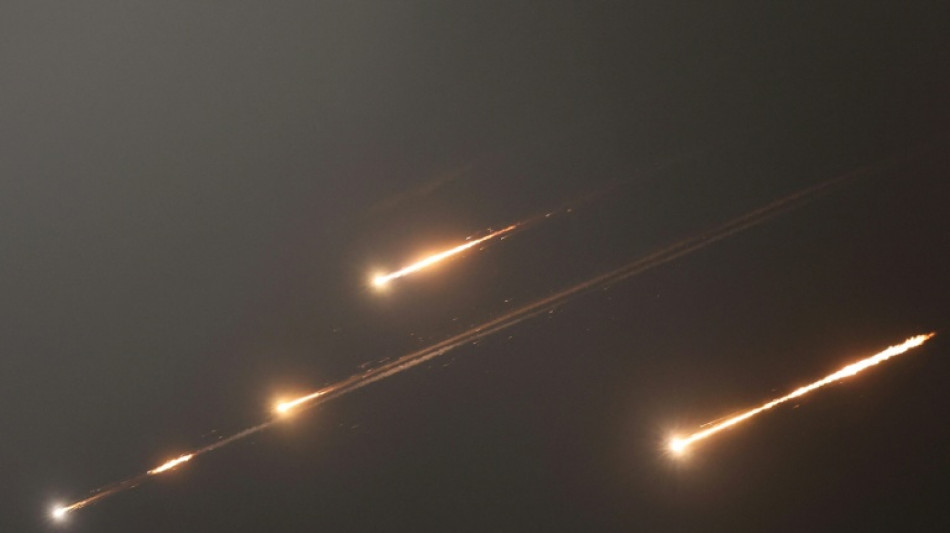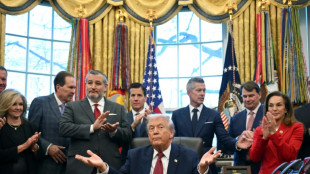

Israel targets Iran's military capabilities
Israel targeted Iran's air defences and missile launchers on Saturday as it pressed its bid to dismantle its arch-foe's military capabilities, after a night of mutual attacks.
Israel's massive strikes on Iran, which it calls an existential threat, have hit nuclear and military facilities, killed top commanders and dozens of civilians, and sought to destroy the country's defence capabilities.
Iran has hit back with volleys of missiles that lit up the night sky over Jerusalem and Tel Aviv, killing three people and wounding dozens.
Following decades of enmity and conflict by proxy, it is the first time that Israel and Iran have traded fire with such intensity, with fears of a prolonged conflict engulfing the region.
Israel began striking Iran early Friday in an operation it has dubbed "Rising Lion", and has since killed several top Iranian generals including senior leaders of the Revolutionary Guards' air arm.
On Saturday, Israel's military said it was striking dozens of missile launchers in Iran after announcing it had targeted air defences with a wave of strikes in the Tehran area.
Two senior Iranian generals have been killed in Israeli strikes, Iranian state television reported Saturday, as Israel kept up its assault.
Iran's ambassador to the United Nations said Friday that 78 people had been killed and 320 wounded in the first wave of strikes by Israel.
Iran called on its citizens to unite in defence of the country as Israeli Prime Minister Benjamin Netanyahu urged them to rise up against their government.
Air raid sirens and explosions rang out across Israel through the night, with many residents holed up in bomb shelters until home defence commanders stood down alerts.
- 'Smoke, dust' -
Israel said dozens of missiles -- some intercepted -- had been fired in the latest salvos from Iran, with AFP images of the city of Ramat Gan near Tel Aviv showing blown-out buildings, destroyed vehicles and streets strewn with debris.
Israeli rescuers said two people were killed and 19 wounded on Saturday by rocket fire on a residential area in the coastal plain.
Iran's Revolutionary Guards said they had attacked dozens of targets in Israel.
Israeli firefighters had worked for hours to free people trapped in a high-rise building in Tel Aviv on Friday.
Resident Chen Gabizon told AFP he ran to an underground shelter after receiving an alert.
"After a few minutes, we just heard a very big explosion, everything was shaking, smoke, dust, everything was all over the place," he said.
Rescuers said 34 people were wounded in the Gush Dan area, including a woman who later died of her injuries, according to Israeli media reports.
Speaking to CNN, Israel's ambassador to the United States, Yechiel Leiter, said Iran had fired three salvos of ballistic missiles on Friday, some 150 in total.
"We expect that the Iranians, who have a considerable volume of ballistic missiles, somewhere in the neighbourhood of 2,000, will continue to fire them," Leiter said.
In Tehran, fire and heavy smoke billowed over Mehrabad airport early Saturday, an AFP journalist said, as Iranian media reported an explosion.
Blasts were heard across the capital as Iran activated its air defences against the incoming fire.
Dozens of Iranians took to the streets to cheer their country's military response, with some waving national flags and chanting anti-Israel slogans.
- 'Time to stop' -
The attacks prompted several countries in the region to temporarily ground air traffic, though on Saturday morning, Jordan reopened its airspace.
Iran's airspace was closed until further notice, state media reported.
As fears mounted of wider conflict, UN chief Antonio Guterres called on both sides to cease fire.
"Enough escalation. Time to stop. Peace and diplomacy must prevail," he said on X late Friday.
US officials said they were helping Israel defend against the missile attacks, even as Washington insisted it had nothing to do with Israel's strikes on Iran.
US President Donald Trump agreed in a call with British Prime Minister Keir Starmer that "dialogue and diplomacy" were needed to calm the crisis, Starmer's office said.
Trump also spoke with the Israeli prime minister, US officials said without elaborating.
In a televised address, Iran's supreme leader Ayatollah Ali Khamenei vowed to bring Israel "to ruin".
The conflict has thrown into doubt plans for a fresh round of nuclear talks between the United States and Iran in Oman on Sunday.
After the first wave of strikes on Friday, Trump urged Iran to "make a deal", adding that Washington was "hoping to get back to the negotiating table".
The United States and other Western governments have repeatedly accused Iran of seeking a nuclear weapon, an ambition it has consistently denied.
Iran said on Saturday its participation in the Oman talks remained "unclear".
"It is still unclear what decision we will make for Sunday," the official IRNA news agency reported, citing foreign ministry spokesman Esmaeil Baqaei.
Baqaei had called the talks "meaningless" in view of the Israeli strikes, which he alleged were carried out with "US permission".
T.Zimmer--NRZ




